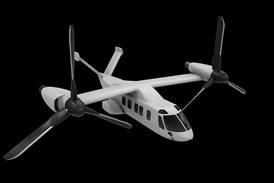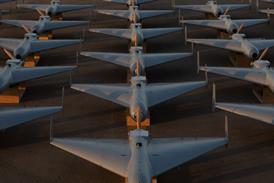As peace settles in Lebanon, British Mediterranean Airways continues to carve out a niche service to Beirut - and beyond.
Alan George/LONDON
BRITISH MEDITERRANEAN Airways (BMA) managing director Des Hetherington sums up his airline's underlying philosophy by saying: "If it is better than our opposition and we can afford it, that is what we will do for our customers."
The airline is too new to be making a profit, but its emphasis on quality has allowed it to carve a market niche. In this year's northern summer, the company's services from London to Beirut enjoyed an average load factor of 83% for eight consecutive weeks, and BMA carried its 25,000th passenger in September.
Private investors
BMA, which now has a staff of 60, including 13 pilots, was formed in 1994 by private investors - mainly businessmen with close business and family ties to Lebanon - who saw that the end of the country's protracted and bloody civil war would bring new demand for air services.
BMA was not the only company to see the potential of a Lebanon at peace, however, and British Airways also announced plans in 1994 to resume services to Beirut. BA's timing was unfortunate, says Hetherington, who is a former commercial director of Kenya Airways.
His original business plan demanded a daily service between London Heathrow and Beirut, but bilateral agreements between the UK and Lebanon permitted no more than seven flights a week. A series of hearings at the UK Civil Aviation Authority concluded with an arrangement under which BMA can fly five times a week and BA twice a week. The CAA further resolved that, if demand justified more flights, BMA would be permitted to operate daily - subject to agreement between the UK and Lebanese Governments.
The airline started its Beirut services in October 1994, using a new Airbus Industrie A320, dry-leased from Dublin's Orix Aviation. The competition from BA on the Beirut route prompted BMA to look for ways of increasing the utilisation of its aircraft. In May, two of the Beirut services were extended to the Syrian capital, Damascus, and two others to the Jordanian capital of Amman.
Further expansion should follow. In July, BMA's board adopted a three-year plan which includes the start of services to Kuwait, Riyadh, Jeddah and Dhahran. The company is now in the final stages of negotiations with the CAA, and envisages consultations between the Kuwaiti, Saudi and UK authorities.
"We are optimistic that these talks will bring an outcome satisfactory to the company," says Hetherington. "We would hope to be in a position to commence operations to Kuwait and Saudi Arabia in April 1996."
For its Kuwaiti and Saudi Arabian services, BMA will acquire two new aircraft. According to Hetherington, the company is "very close to a decision" on whether to choose Airbus A310-300s or Boeing 767-200ERs, but no commitments will be made with aircraft lessors until licensing arrangements for the new routes have been finalised with the CAA.
Beyond the planned Kuwaiti and Saudi Arabian services, BMA is now "...not eyeing anything else at all," says Hetherington. "Over the next three years we hope to increase to a fleet of three aeroplanes operating a range of services to seven destinations in five countries in the Near and Middle East," he stresses. "That will certainly keep us very busy through 1999 without any trouble at all."
Additional expansion will come only if the company exceeds the performance targets in its three-year business plan.
As a private company, BMA does not have to publish financial details, although Hetherington says that it has lost money this year, and is expected to continue to lose money in 1996 before breaking even in 1997. "Without further expansion, we anticipate moving straight into profitability thereafter," says Hetherington.
Class wisdom
To date, BMA has offered a three-class configuration on its routes: Presidential First (eight seats) with a 1.5m seat pitch; Premier Business (16 seats) with a 990mm seat pitch; and Premium Economy (102 seats) with a 810mm pitch. The wisdom of having three classes in a narrow-bodied aircraft is the subject of debate, says the managing director. A board meeting before the end of October will decide whether to reduce to two classes. Any such change would be implemented by the second quarter of 1996.
Despite BMA's fierce commercial rivalry with BA on the routes each airline serves, all BMA's engineering work is performed by BA. "They give an excellent level of support," says Hetherington. "Granted, they are a competitor, but they are an absolute Goliath. We are an absolute minnow. It hasn't compromised our position at all."
BMA arose in response to the end of the civil war in Lebanon, but peace is now breaking out elsewhere in the region. The Palestinian-Israeli peace process persists, despite setbacks. Jordan and Israel signed a peace treaty in 1994, while Syria and Israel are negotiating an accord which will lead to a Lebanese-Israeli peace treaty.
Suddenly, the area is looking more attractive to business travellers and tourists than at any time in the past 50 years. BMA seems poised to reap a fair share of the peace dividend.
Source: Flight International























